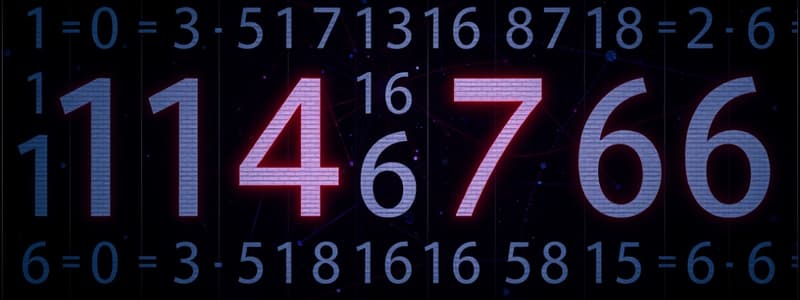Podcast
Questions and Answers
Which of the following is the correct prime factorization of $882 \times 98$?
Which of the following is the correct prime factorization of $882 \times 98$?
- 22 × 32 × 74
- 24 × 33 × 7 × 112
- 23 × 32 × 74 × 11 (correct)
- 24 × 33 × 72
If x and y are two even integers, then which of the following expressions is always odd?
If x and y are two even integers, then which of the following expressions is always odd?
- *x*^2 + *y*^2 + 2*x*y + 1
- *x* + *y* + 1 (correct)
- *x* × *y* - 2
- *x*^2 + *y*^2 + 4
Which of the following numbers is not divisible by 3?
Which of the following numbers is not divisible by 3?
- 567890 (correct)
- 456789
- 234567
- 345678
The LCM of two numbers is 840 and their HCF is 12. If one of the numbers is 84, what is the other number?
The LCM of two numbers is 840 and their HCF is 12. If one of the numbers is 84, what is the other number?
If the product of two prime numbers is 187, what is the sum of these numbers?
If the product of two prime numbers is 187, what is the sum of these numbers?
Which of the following is a multiple of 11?
Which of the following is a multiple of 11?
If n is an integer such that n^2 + n + 41 is prime, which of the following could be the value of n?
If n is an integer such that n^2 + n + 41 is prime, which of the following could be the value of n?
Which of the following numbers is not a perfect square?
Which of the following numbers is not a perfect square?
The sum of all odd numbers between 1 and 101 is:
The sum of all odd numbers between 1 and 101 is:
Flashcards are hidden until you start studying
Study Notes
Prime Factorization and Even/Odd Integers
- Prime factorization involves expressing a number as the product of its prime factors. Example: 882 × 98's factorization options.
- If x and y are even integers, adding an odd number (like 1) makes the expression always odd.
Divisibility Rules
- A number is divisible by 3 if the sum of its digits is divisible by 3. Example numbers examined for blocks of 3.
- A number is not divisible by 3: 567890; sum of the digits = 36, which is not divisible by 3.
Lowest Common Multiple (LCM) and Highest Common Factor (HCF)
- LCM of two numbers is the smallest number that is a multiple of both; in this case, the relationship LCM × HCF = Product of the numbers allows finding the unknown number when one number is given.
Prime Numbers
- The product of two primes is 187, which factors into 11 and 17, whose sum is 28.
Multiples and Perfect Squares
- A multiple of 11 can be checked by subtracting twice the last digit from the rest of the number.
- Perfect squares arise from integer square roots; 2305 is not a perfect square.
Arithmetic Summation
- The sum of all odd numbers from 1 to 101 can be calculated using the formula for the sum of an arithmetic series: n/2 × (first term + last term). The sum equals 2500.
Studying That Suits You
Use AI to generate personalized quizzes and flashcards to suit your learning preferences.




